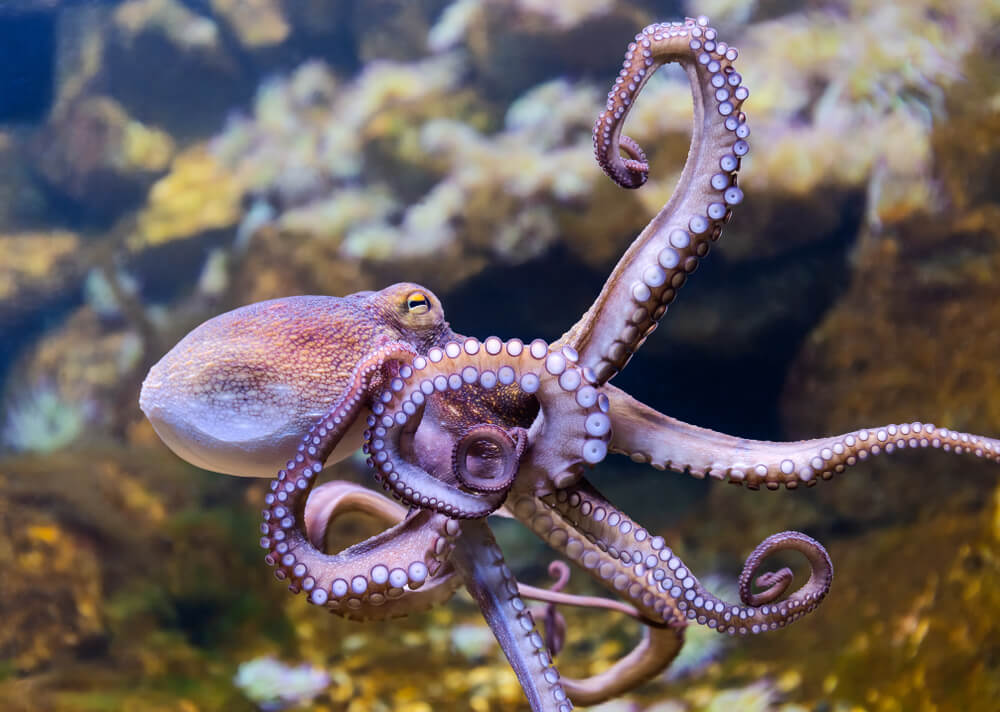Octopus intelligence is an issue that is increasingly attracting the attention of scientists. These creatures, found almost between an alien from the oceans and a brain with suction cups, have an incredible mind. One detail: the more than 500 million neurons that cephalopods. possess are in their tentacles and, with them, explore, feel, smell, and even make decisions.
The intelligence of octopuses is today a great mystery to experts. They have lasting social connections, create tools, and we know that when we keep them inside, they develop phobias and design smart strategies to escape.
- People who work in aquariums or in places like this know that the most problematic animals are octopuses.
- Everyone who works in these facilities often tell fascinating stories about these animals; who have made adventures to escape and even enter tanks next to them and steal food from other marine species.
- They’re really fascinating.
For many scientists, however, the unusual intelligence of cephalopods is not at all remarkable, some say that all these skills respond to a simple ecological intelligence, that is, animals develop certain strategies based on environmental demands, so octopuses are nothing more than very ingenious beings when it comes to getting food almost everywhere.
However, there is a surprising fact. Piero Amodio, a scientist at the University of Padua, Italy, recorded a video that quickly viralized, shows an octopus using all his wits to get a shell and penetrate it, then the animal keeps the shell and takes it with him because he knows it’s his “tool”, and that it can be useful to him in the most ingenious way. We see that in clear planning.
More than 275 million years ago, cephalopods had an outer layer, this feature allowed them to fend off predators, but it had a limit: it was difficult to find food.
Thus, freeing themselves from this shell has made it easier for them to explore their surroundings, penetrate narrower holes, gain strength to break shells, stones and also hunt more accurately.
However, with no shield, they have become vulnerable, so they are quite ingenious in finding substitutes to protect themselves with. However, the intelligence of the octopus goes beyond these tasks.
One of the leading experts in the field is Peter Godfrey-Smith, an Australian philosopher in constant contact with these creatures, whose goal is to explore the origin of consciousness through cephalopods.
Thus, the octopus, the sea and the deep origins of consciousness represent a very curious work, in which it is worth deepening to better understand these beings and, therefore, a part of ourselves.
In this, Godfrey-Smith recounts his encounter with an Australian giant cuttlefish, an animal that, far from fearing the scientist, observed him and approached him to caress him with enormous curiosity. This delicate touch left its mark on it forever.
“You will love no less man, but you will love cephalopods more. “- Lord Byron-
Without a doubt, these data are surprising. Eli Eisenberg, a scientist at Tel Aviv University, conducted a study on the intelligence of octopuses to discover that these animals are capable of “manipulating” their own genetic code.
Cephalopods? Improve your nervous system according to the climate requirements of the environment. What your organisms are doing is recombining ribonucleic acid (RNA), sending new proteins to genes to improve their adaptation. Something that humans can only achieve slowly through evolution, they realize according to their needs.
Octopuses have about 500 million neurons, the same amount as a dog; however, cephalopods have their nervous system divided into tentacles, so they have 9 brains: one central and eight peripheral.
The tentacles are undoubtedly an indispensable part of the octopus’ intelligence. With them they explore, smell, taste and even make decisions. In other words, each tentacle can make a separate particular decision from others; however, they work together in harmony and without differences.
“When you dive into the sea, you immerse yourself in the origin of all of us. “Peter Godfrey-Smith,? Other spirits: the octopus, the sea and the deep origins of consciousness ??
Biologists have discovered that some squid communicate with each other through a system similar to morse code. In addition, people who are used to observing the behavior of octopuses know that they are extremely creative.
They build their own hideouts, are able to solve problems creatively, face challenges, open lids, boxes, hunt with originality and, in addition, demonstrate behavior similar to that of humans.
When they’re in a place they don’t like, they can throw water at their caregivers when they see them, develop manias and tastes. They have favorite items and they also have the ones they don’t like and don’t hesitate to destroy. They are naughty and develop attachment to some caregivers and hatred for others.
In conclusion, as the philosopher Peter Godfrey-Smith points out, entering the world of octopus intelligence also means entering our own consciousness. In the end, the spirit appeared at sea; the origin of all life comes from the oceanic world and, therefore, to look into the eyes of a cephalopod is to be aware that we have a shared history with them.

